Latest News
Former Japanese PM Shinzo Abe dies after being shot while campaigning
Published
4 years agoon
By

Japan’s former prime minister Shinzo Abe, the country’s longest-serving leader, was pronounced dead on Friday afternoon, the hospital treating him confirmed, after he was shot at a campaign event.
“Shinzo Abe was transported to (the hospital) at 12:20pm. He was in a state of cardiac arrest upon arrival. Resuscitation was administered. However, unfortunately he died at 5:03pm,” said Hidetada Fukushima, professor of emergency medicine at Nara Medical University hospital.
Abe, 67, was delivering a stump speech with security present, but spectators were able to approach him fairly easily.
NHK quoted the suspect, identified as Tetsuya Yamagami, as telling police he was dissatisfied with Abe and wanted to kill him. He has since been taken into custody.
The suspect opened fire on Abe from behind with an apparently homemade gun as he spoke at a drab traffic island in the western city of Nara, Japanese media showed earlier.
Footage broadcast by NHK showed Abe standing on a stage when a loud blast was heard with smoke visible in the air.
Security officials were then seen tackling a man in a grey T-shirt and beige trousers.

It was the first assassination of a sitting or former Japanese premier since the days of prewar militarism in the 1930s.
Nara emergency services said he had been wounded on the right side of his neck and left clavicle.
His brother, Defence Minister Nobuo Kishi, had said earlier that Abe was getting blood transfusions.
Speaking before Abe’s death was announced, incumbent Prime Minister Fumio Kishida condemned the shooting in the “strongest terms” while Japanese people and world leaders expressed shock at the violence in a country in which political violence is rare and guns are tightly controlled.
“Former prime minister Shinzo Abe was shot in Nara and I have been informed he is in a very grave condition,” PM Kishida had told reporters after arriving in Tokyo by helicopter from the campaign trail.
“It is a barbaric act during election campaigning, which is the foundation of democracy, and it is absolutely unforgivable. I condemn this act in the strongest terms.”
The attack had taken place shortly before noon in the country’s western region of Nara, and “one man, believed to be the shooter, has been taken into custody”, government spokesman Hirokazu Matsuno earlier told reporters.
Several media outlets described 41-year-old Yamagami as a former member of the Maritime Self-Defence Force, the country’s navy.
‘A large bang’
Witnesses at the scene described shock as the political event turned into chaos.
“He was giving a speech and a man came from behind,” a young woman at the scene told NHK.
“The first shot sounded like a toy bazooka. He didn’t fall and there was a large bang. The second shot was more visible, you could see the spark and smoke,” she added.
“After the second shot, people surrounded him and gave him cardiac massage.”
Abe was bleeding from the neck, witnesses said and photographs showed. He was reportedly initially conscious but subsequently lost consciousness, NHK reported.
Officials from the local chapter of Abe’s Liberal Democratic Party said there had been no threats before the incident and that his speech had been announced publicly.
‘Profoundly sad and shocking’
Abe, Japan’s longest-serving prime minister, held office in 2006 for one year and again from 2012 to 2020, when he was forced to step down due to the debilitating bowel condition ulcerative colitis.
He is a hawkish conservative who pushed for the revision of Japan’s pacifist constitution to recognise the country’s military and has stayed a prominent political figure even after his resignation.
Japan has some of the world’s toughest gun-control laws, and annual deaths from firearms in the country of 125 million people are regularly in single figures.
Getting a gun licence is a long and complicated process even for Japanese citizens, who must first get a recommendation from a shooting association and then undergo strict police checks.
Japan has seen “nothing like this for well over 50 to 60 years,” Corey Wallace, an assistant professor at Kanagawa University who focuses on Japanese politics, told AFP.
He said the last similar incident was likely the 1960 assassination of Inejiro Asanuma, the leader of the Japan Socialist Party, who was stabbed by a right-wing youth.
“But two days before an election, of a (man) who is so prominent … it’s really profoundly sad and shocking.”
He noted, too, that Japanese politicians and voters are used to a personal and close-up style of campaigning.
“This could really change. “
‘Despicable attack’
When Abe’s death was announced, the attack prompted international shock.
Prime Minister Shehbaz Sharif extended his condolences over Abe’s death.
“He made invaluable contributions to the Pakistan-Japan relationship. Our prayers are with [the] bereaved family. At this difficult time, we stand in solidarity with the people of Japan,” he said.
I extend my profound condolences over the sad demise of former Japanese Prime Minister Shinzo Abe. He made invaluable contributions to the Pakistan-Japan relationship. Our prayers are with bereaved family. At this difficult time, we stand in solidarity with the people of Japan.
— Shehbaz Sharif (@CMShehbaz) July 8, 2022
UN Secretary-General Antonio Gutteres said he was “deeply saddened” by the assassination. He said he would always remember his always remember “collegiality and commitment to multilateralism”.
I’m deeply saddened by the horrific killing of Shinzo Abe, former Prime Minister of Japan.
— António Guterres (@antonioguterres) July 8, 2022
I had the privilege of knowing him for years & will always remember his collegiality & commitment to multilateralism.
My condolences to his family, and the people & Government of Japan.
US State Secretary Antony Blinken voiced alarm over the shooting.
“This is a very, very sad moment,” Blinken told reporters at a G20 meeting in Bali, saying the United States was “deeply saddened and deeply concerned”.
Thailand’s Prime Minister Prayut Chan-O-Cha was “very shocked” at Abe’s shooting, the kingdom’s foreign affairs minister said, describing the pair as friends.
Indian Prime Minister Narendra Modi said he was “deeply distressed” by the shooting of Abe, describing the former Japanese premier as a “dear friend”.
“Deeply distressed by the attack on my dear friend Abe,” Modi wrote on Twitter. “Our thoughts and prayers are with him, his family, and the people of Japan. “
Deeply distressed by the attack on my dear friend Abe Shinzo. Our thoughts and prayers are with him, his family, and the people of Japan.
— Narendra Modi (@narendramodi) July 8, 2022
British Prime Minister Boris Johnson said he was utterly appalled and saddened to hear about the “despicable attack”.
“My thoughts are with his family and loved ones,” he said on Twitter.
Utterly appalled and saddened to hear about the despicable attack on Shinzo Abe.
— Boris Johnson (@BorisJohnson) July 8, 2022
My thoughts are with his family and loved ones.
New Zealand PM Jacinda Ardern issued a statement, saying she was “deeply shocked”.
“He was one of the first leaders I formally met when I became prime minister. He was deeply committed to his role, and also generous and kind. I recall him asking after the recent loss of our pet when I met him, a small gesture but one that speaks to the kind of person he is,” she said.
“My thoughts are with his wife and the people of Japan. Events like this shake us all to the core,” Ardern said.
Australian Prime Minister Anthony Albanese termed the incident shocking.
“Shocking news from Japan that former PM Shinzo Abe has been shot — our thoughts are with his family and the people of Japan at this time,” he tweeted.
Shocking news from Japan that former PM Shinzo Abe has been shot – our thoughts are with his family and the people of Japan at this time
— Anthony Albanese (@AlboMP) July 8, 2022
You may like
-
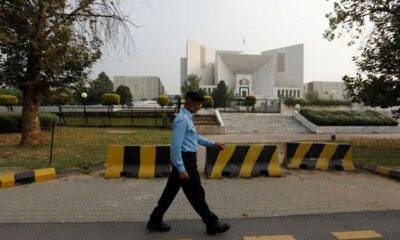

Supreme Court annuls trials of civilians in military courts
-
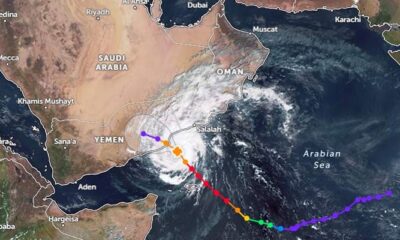

Sea conditions ‘very high’ as Cyclone Tej moves towards northwestward
-


IMF condition: ECC set to green light gas tariff hike today
-


UN experts claim Israeli actions in Gaza ‘violation of international humanitarian law’
-
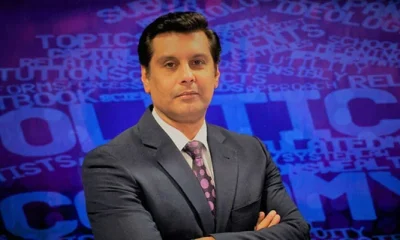

Arshad Sharif’s wife files lawsuit against Kenyan police over journalist’s killing
-
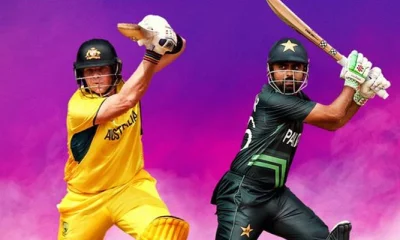

World Cup 2023: Pakistan opt to bowl first against Australia after winning toss

In a unanimous verdict, a five-member bench of the Supreme Court on Monday declared civilians’ trials in military courts null and void as it admitted the petitions challenging the trial of civilians involved in the May 9 riots triggered by the arrest of Pakistan Tehreek-e-Insaf (PTI) chief Imran Khan in a corruption case.
The five-member apex court bench — headed by Justice Ijaz Ul Ahsan, and comprising Justice Munib Akhtar, Justice Yahya Afridi, Justice Sayyed Mazahar Ali Akbar Naqvi and Justice Ayesha Malik — heard the petitions filed by the PTI chief and others on Monday.
The larger bench in its short verdict ordered that 102 accused arrested under the Army Act be tried in the criminal court and ruled that the trial of any civilian if held in military court has been declared null and void.
The apex court had reserved the verdict earlier today after Attorney General of Pakistan (AGP) Mansoor Usman Awan completed his arguments centred around the domain and scope of the military courts to try the civilians under the Army Act.
At the outset of the hearing today, petitioner lawyer Salman Akram Raja told the bench that trials of civilians already commenced before the top court’s verdict in the matter.
Responding to this, Justice Ahsan said the method of conducting proceedings of the case would be settled after Attorney General of Pakistan (AGP) Mansoor Usman Awan completed his arguments.
Presenting his arguments, the AGP said he would explain to the court why a constitutional amendment was necessary to form military courts in 2015 to try the terrorists.
Responding to Justice Ahsan’s query, AGP Awan said the accused who were tried in military courts were local as well as foreign nationals.
He said the accused would be tried under Section 2 (1) (D) of the Official Secrets Act and a trial under the Army Act would fulfill all the requirements of a criminal case.
“The trial of the May 9 accused will be held in line with the procedure of a criminal court,” the AGP said.
The AGP said the 21st Amendment was passed because the terrorists did not fall in the ambit of the Army Act.
“Amendment was necessary for the trial of terrorists [then] why amendment not required for the civilians? At the time of the 21st constitutional amendment, did the accused attack the army or installations?” inquired Justice Ahsan.
AGP Awan replied that the 21st Amendment included a provision to try accused involved in attacking restricted areas.
“How do civilians come under the ambit of the Army Act?” Justice Ahsan asked the AGP.
Justice Malik asked AGP Awan to explain what does Article 8 of the Constitution say. “According to Article 8, legislation against fundamental rights cannot be sustained,” the AGP responded.
Justice Malik observed that the Army Act was enacted to establish discipline in the forces. “How can the law of discipline in the armed forces be applied to civilians?” she inquired.
The AGP responded by saying that discipline of the forces is an internal matter while obstructing armed forces from discharging duties is a separate issue.
He said any person facing the charges under the Army Act can be tried in military courts.
“The laws you [AGP] are referring to are related to army discipline,” Justice Ahsan said.
Justice Malik inquired whether the provision of fundamental rights be left to the will of Parliament.
“The Constitution ensures the provision of fundamental rights at all costs,” she added.
If the court opened this door then even a traffic signal violator will be deprived of his fundamental rights, Justice Malik said.
The AGP told the bench that court-martial is not an established court under Article 175 of the Constitution.
At which, Justice Ahsan said court martials are not under Article 175 but are courts established under the Constitution and Law.
After hearing the arguments, the bench reserved the verdict on the petitions.
A day earlier, the federal government informed the apex court that the military trials of civilians had already commenced.
After concluding the hearing, Justice Ahsan hinted at issuing a short order on the petitions.
The government told the court about the development related to trials in the military court in a miscellaneous application following orders of the top court on August 3, highlighting that at least 102 people were taken into custody due to their involvement in the attacks on military installations and establishments.
Suspects express confidence in mly courts
The same day, expressing their “faith and confidence” in military authorities, nine of the May 9 suspects — who are currently in army’s custody — moved the Supreme Court, seeking an order for their trial in the military court be proceeded and concluded expeditiously to “meet the ends of justice”.
Nine out of more than 100 suspects, who were in the army’s custody, filed their petitions in the apex court via an advocate-on-record.
The May 9 riots were triggered almost across the country after former prime minister Imran Khan’s — who was removed from office via a vote of no confidence in April last year — arrest in the £190 million settlement case. Hundreds of PTI workers and senior leaders were put behind bars for their involvement in violence and attacks on military installations.
Last hearing
In response to the move by the then-government and military to try the May 9 protestors in military courts, PTI Chairman Imran Khan, former chief justice Jawwad S Khawaja, lawyer Aitzaz Ahsan, and five civil society members, including Pakistan Institute of Labour Education and Research (Piler) Executive Director Karamat Ali, requested the apex court to declare the military trials “unconstitutional”.
The initial hearings were marred by objections on the bench formation and recusals by the judges. Eventually, the six-member bench heard the petitions.
However, in the last hearing on August 3, the then-chief justice Umar Ata Bandial said the apex court would stop the country’s army from resorting to any unconstitutional moves while hearing the pleas challenging the trial of civilians in military courts.
A six-member bench, led by the CJP and comprising Justice Ijaz Ul Ahsan, Justice Munib Akhtar, Justice Yahya Afridi, Justice Sayyed Mazahar Ali Akbar Naqvi, and Justice Ayesha Malik, heard the case.
In the last hearing, the case was adjourned indefinitely after the Attorney General for Pakistan (AGP) Mansoor Usman Awan assured the then CJP that the military trials would not proceed without informing the apex court.

YouTube’s famous couple Sham Idrees and Froggy aka Sehar are taking sometime away from each other in their relationship.
Sham, taking it to his Instagram, left his fans in a shock after announcing his separation with Froggy. He wrote: “I would like to announce that me and froggy are taking sometime away from each other in our relationship. Please don’t involve me in issues concerning froggy, rabil or any of the other family members. I appreciate some privacy during this difficult time.”
Sham is a Canadian based YouTuber, who has a following of 1.4 million people on Instagram, is widely-known for his entertaining content. His videos often feature his wife Sehar along with him.
The couple tied the knot a few years ago and is parents to baby Sierra who is two-years old. The duo welcomed another daughter on September 28, 2022. They named her Shanaya Idrees.
After the birth of his first daughter, Sham Idrees also introduced his fans to his daughter Dua from his previous marriage.

- Minister says power generation units are temporarily shut in winter at night.
- Says frequency variation in national grid triggered outage.
- Says ministry trying to restore power in next 12 hours.
LAHORE/KARACHI/QUETTA/ISLAMABAD: A countrywide power breakdown, triggered by a “frequency variation” in the national grid early Monday morning, has left large parts of the country including Karachi, Lahore, Islamabad, Peshawar and Quetta without electricity.
Power Minister Khurrum Dastagir, while talking to Geo News, said that the power generation units are temporarily shut down in winter at night as an economic measure to save fuel costs.
“When the systems were turned on at 7:30am this morning one by one, frequency variation was reported in the southern part of the country between Jamshoro and Dadu. There was a fluctuation in voltage and power generating units were shut down one by one due to cascading impact. This is not a major crisis,” said the federal minister as the country plunged into darkness for the second time in four months.
The minister said that his ministry has started restoring some grid stations in Tarbela and Warsak.
“Peshawar Electric Supply Company (PESCO) and some grids of Islamabad Electric Supply Company (IESCO) have already been restored,” claimed the minister.
Talking about the breakdown in Karachi, the minister said that the matter in the port city is complicated as it has a complete electric supply system.
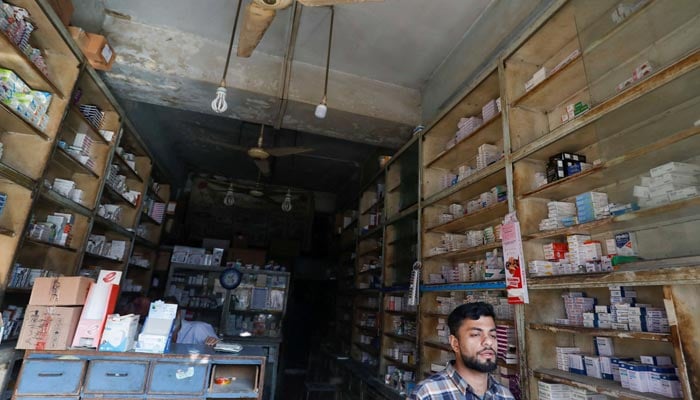
“We provide K-Electric about 1,000-1,100 megawatts routinely, however, it will be restored within a few hours. It is not certain how long will it take to sort this issue. However, my target is to restore electricity in the country in the next 12 hours,” said the minister.
Before the energy ministry’s announcement, different power distribution companies had confirmed the breakdown.
According to Quetta Electric Supply Company (QESCO), the two transmission lines have tripped leaving 22 districts of Balochistan, including Quetta without power.
Karachi power update
Meanwhile, K-Electric spokesperson Imran Rana said that at approximately 7:34am today, the national grid experienced a loss of frequency, affecting the power supply to multiple cities across Pakistan
“This has also cascaded to KE’s network affecting power supply to Karachi,” Rana said, adding the KE’s network is safe and protected.
“Our teams are actively monitoring the situation and enabling restoration efforts.”
An IESCO spokesperson said that its 117 grid stations were without electricity.
Meanwhile, PESCO also confirmed the outage in areas where it supplies electricity.
This is the second time within four months that a country was hit by a major power breakdown.
NEPRA takes notice
The National Electric Power Regulatory Authority (NEPRA), in a statement, said that it has taken “serious notice” of the power outage and directed the National Transmission & Despatch Company (NTDC) to submit a “detailed report”.
The statement also said that the regulator has previously imposed fines on similar outages in the 2021 and 2022. It also shared that NEPRA has consistently issued directives and recommendations on tackling such events in future.
Previous breakdown
In October of last year, Karachi, Hyderabad, Sukkur, Quetta, Multan, and Faisalabad were hit by a power outage.
At that time, the power minister said that nearly 8,000 megawatts of power went offline.
Back then, Dastagir had said that the simultaneous faults in two power lines, which had triggered the breakdown, at the same time was concerning for the government. He had also announced that an in-depth inquiry was ordered and promised action.
A timeline of power breakdowns in Pakistan
The country’s generation and distribution network has suffered eight major power breakdowns during the last nine years.
In 2014 and 2017, nationwide blackouts were caused by a fault in Tarbela Power Station while fog, frequency variation and the Guddu Power Plant fault were blamed for breakdowns in 2015, 2018, 2019, 2021, 2022 and 2023.
Every time the party in power announced to conduct a comprehensive probe and vowed to rectify the issues but nothing has happened despite multiple inquiries.


Supreme Court annuls trials of civilians in military courts

Sea conditions ‘very high’ as Cyclone Tej moves towards northwestward

IMF condition: ECC set to green light gas tariff hike today

Barwaan Khiladi: Kinza Hashmi discusses her role as Alia

Snap launches tools for parents to monitor teens’ contacts

WATCH: Pakistani traveller deported from Dubai for damaging plane mid-air

Learn First | How to Create Amazon Seller Account in Pakistan – Step by Step

Sajjad Jani Funny Mushaira | Funny Poetry On Cars🚗 | Funny Videos | Sajjad Jani Official Team

